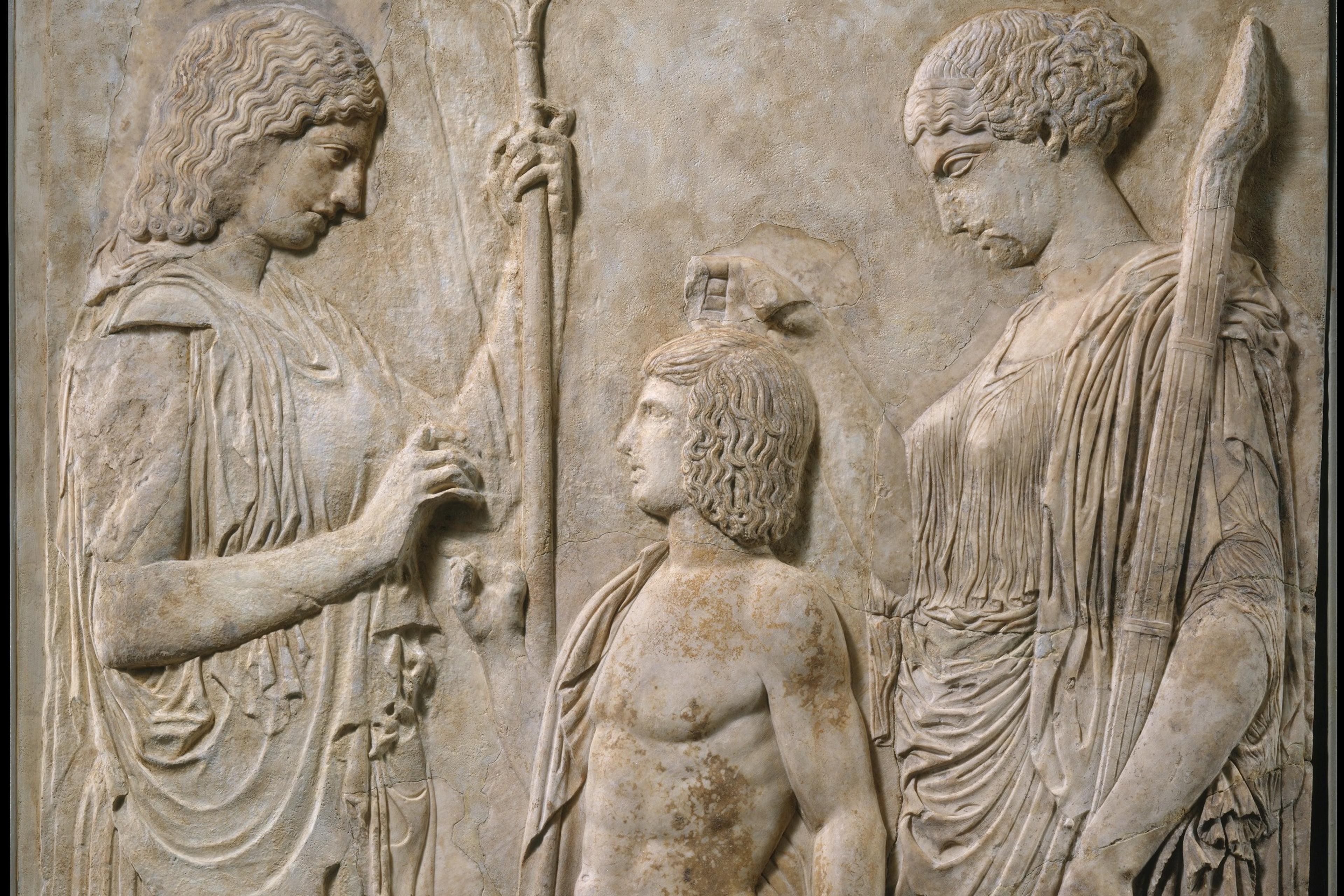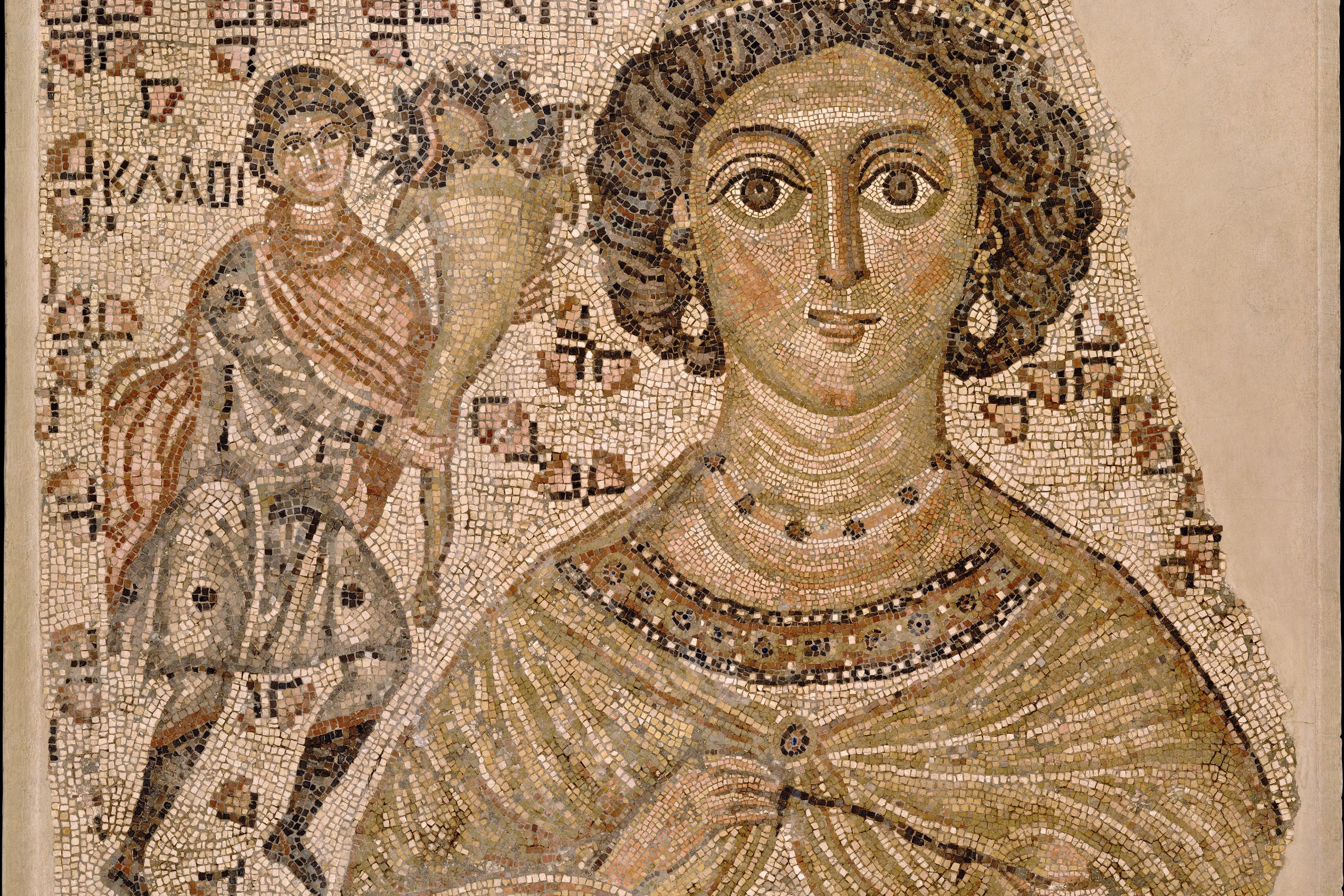Socrates, on his way to the Lyceum, meets two hyper-competitive teenage boys hanging out in a wrestling gym. Almost immediately, he begins asking the sort of questions that turn everything upside down, questions that may seem silly or pointless but tend to get at the very foundations of people’s views. He asks one of the young men, Lysis (after whom the dialogue is named), a preposterous question: does his mother ever let him play with her wool and her loom while she’s weaving? Lysis simply laughs. Not only would she stop him from doing that, he replies, but she’d strike him if he even tried.
Why does Lysis laugh? Part of the reason is that, in ancient Athens, weaving is a famously feminine activity, to the point of being called, by the classicist Ruby Blondell, ‘the signature activity of women in Greek ideology’. Penelope weaves in Homer’s Odyssey, and Arachne challenges the goddess Athena to a weaving contest, only to be turned into a spider: both human and divine women are regularly depicted weaving in ancient Greek art and literature. So, asking a teenage boy on the cusp of manhood if his mother wants him to play with iconically feminine things like wool and looms could hardly do more than earn a derisive snort in response.
But the brief interaction is telling. Can we learn, question and rethink gender norms with the help of Plato? Although this Greek philosopher lived and wrote thousands of years ago in a very different culture with different norms, many of his works invite us to reimagine gender norms in ways that continue to resonate today.
Unlike driving a chariot, weaving is simply something an Athenian man would never do. Of course, Socrates (by which I mean the character in Plato’s writing; the ‘real’ Socrates lies forever out of reach) is famous for saying strange and silly things, so in some ways his question to Lysis shouldn’t really surprise us. What’s remarkable, though, is the off-handed way in which Socrates challenges conventional gender norms. What he really seems to want is to inspire Lysis and his friend to pursue philosophy. His question about weaving, as I have argued elsewhere, reminds them – and us – that the stakes are high, and that a truly philosophical life is one in which traditional norms, including gender norms, get scrambled.
Ultimately, texts like the Lysis challenge us to reimagine what masculinity might ask of those of us who identify as men. Perhaps this reveals Plato as a kind of proto-feminist, as some scholars suggest he may be. And, indeed, in the landscape of ancient Greek thought, there’s no surviving work that comes anywhere near as close to feminism as what we find in Plato. On the other hand, there’s too much misogyny in Plato’s works to be able to easily count him as a feminist. As with all the best questions, the question of Plato’s feminism, therefore, ought to remain open. Regardless, he clearly challenges masculinity because for him philosophy is ultimately about liberation – and liberation is possible only if we are willing to free ourselves from our preconceptions, including our preconceptions about gender.
By questioning competition, Plato is questioning a pedestal of masculinity
It’s hard to think of a place with more oppressive gender roles than ancient Athens. Women lived in separate quarters from men and were largely expected to remain secluded and sequestered in their homes. They could neither own property nor speak on their own behalf in the courts, and wore veils when they ventured out. And all of this applies to free Athenian women – things were even bleaker for enslaved women. Pericles, the renowned orator and leader of the city during the Peloponnesian War, went as far as to say that the women who earn the greatest glory are the ones seen and heard the least.
Men too lived within strict gendered expectations of what counted as acceptably masculine. Those perceived to move outside of these bounds were often held up for ridicule. In the play Thesmophoriazusae, for instance, Aristophanes ruthlessly mocks his fellow writer Agathon for his perceived effeminacy right from his first entry onstage: he arrives in women’s clothing, and the jokes keep going from there. Naturally, a boy like Lysis would laugh out loud when asked if his mother might let him play with her weaving tools.
Although the question about weaving marks the most obvious challenge to gender norms in the text, it isn’t the only such challenge. Lysis and his friend Menexenus are hyper-competitive, even to the point of arguing, strangely enough, which one is older. Such competitive behaviour is expected and encouraged among men in Athens. In fact, the festival of Hermes, which is taking place while Socrates is speaking with the boys, was a celebration of competitiveness and included contests such as judging the beauty of male bodies. But Socrates, querying this all-embracing competitiveness, reminds the boys of the saying that ‘friends have all things in common’, and encourages all present to engage in a cooperative discussion rather than any kind of competition. By questioning competition, he is questioning a pedestal of masculinity.
Socrates himself is a living challenge to reigning gender stereotypes. Athenian men are expected to focus on honour, money and political activity; Socrates avoids and often criticises all of those. Likewise, he helps Lysis to see that a meaningful life comes from seeking wisdom rather than from money or power.
Socrates’ sense of self-worth does not depend on the opinions of others, and in many ways that seems to be the lesson for Lysis as well. Rather than thinking that his parents would prove their love by letting him drive their chariots or play with their looms, Lysis should come to see that his value comes from within rather than from the opinions of strangers or even loved ones. And the thing in Lysis that gives him worth is precisely this ability to see past social norms and seek meaning. In other words, it is his ability to freely choose a philosophical life.
He argues not out of a desire to liberate women, but in the interest of making the most efficient city
Although these subtle challenges to gender norms help make sense of Socrates’ conversation with Lysis, some less subtle challenges to gender in other texts by Plato help us see that this is not a fluke of one short text, but rather characterises much of Plato’s thought. In the Symposium, Socrates tells his friends he learned everything he knows from a wise woman named Diotima – and then he proceeds to explain philosophy as involving being pregnant and giving birth to ideas. And in the Theaetetus, he explains that his work as a philosopher is a type of midwifery, though, unlike female midwives, he works with men, helping them give birth to their ideas. In a culture as misogynistic as his, it’s remarkable to see Socrates repeatedly describe his work through these feminine images.
Perhaps even more remarkably, in the Republic Socrates argues that, in the best city, women would do all the work Athenians think of as men’s work, including being soldiers, philosophers and rulers. He’s arguing for this not out of a desire to liberate women, but rather in the interest of making the most efficient city possible, a city in which a woman gifted at warfare wouldn’t be stuck at home weaving. Although he may not be a feminist, Socrates is clearly seeking a world liberated from accepted norms, including gender norms. Similarly, he seeks a sort of masculinity that also draws on supposedly feminine virtues.
This idea of being freed from accepted norms points to the focus on liberation in Plato’s thought. As much as he might be asking us to rethink masculinity and move beyond stereotypical gender norms, the ultimate goal isn’t a rejection of gender norms or a non-toxic model of masculinity (much as we might wish it were). Instead, the goal is bigger, and therefore more difficult – the goal is liberation, the sort of liberation possible only through deep engagement with philosophy. It’s fitting, of course, that the goal should be difficult: one of Plato’s favourite ancient Greek aphorisms, which has also become a touchstone in my own life, is χαλεπὰ τὰ καλά: beautiful things are difficult.
Many thanks to the Department of Philosophy at Seattle University for supporting my research, and thank you to the Whiteley Center at the University of Washington’s Friday Harbor Laboratories for the hospitality and the beautiful setting for writing.








